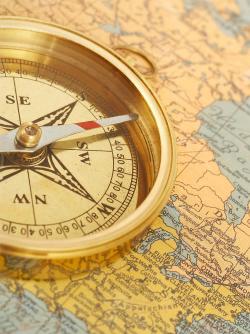China Rising in a Post-Pandemic World
Why is China’s economy growing so fast? And what does it mean for Asia and the world? See what Bible prophecy says about the future of one of the oldest civilizations on earth.
On July 1 this year, the Chinese Communist Party will celebrate the one-hundredth anniversary of its founding in 1921. Movie theatres in China have been ordered to show patriotic films, and revolutionary heroes are being highlighted to stir the spirit of “the Chinese dream” in its 1.4 billion people. The official slogan for the celebrations is “Follow the Party Forever” (“‘Follow the Party Forever’: China Plans a Communist Birthday Bash,” NYTimes.com, April 19, 2021). The People’s Republic of China (PRC) wants the world to know that it is emerging as a true superpower amid an out-of-control pandemic. While powers such as the United States and the European Union struggle to overcome the COVID-19 crisis and focus on kickstarting their economies, China’s gross domestic product “jumped 18.3 per cent in the first quarter of 2021 compared to a year earlier…. That was the fastest growth since quarterly records began in 1992 and was up from 6.5 per cent in the fourth quarter last year” (“China’s economy grew 18.3 per cent in the first quarter of 2021, but it looks like its COVID-19 rebound is levelling off,” ABC.net.au, April 16, 2021).
Many nations in Southeast Asia see this sudden economic rise as a cause for concern. Although the world may never know exactly how the COVID-19 pandemic began, the PRC is ready to move past a disease that much of the world associates with China—and wants to demonstrate that it will not back down from acting on its global aspirations. What can we expect from China in a post-pandemic world? What does Bible prophecy say about China’s future?
Chinese Expansion Ahead?
After the Chinese Revolution of 1949, the Chinese Communist Party began its rule by seeking to expand its presence and encourage communism throughout Southeast Asia. This led to multiple conflicts, including the Korean and Vietnam Wars, as well as the Malayan Emergency (1948–1960). Since then, China has only become more influential as a world leader in manufacturing, exports, and imports. Today, most of Southeast Asian economic stability relies heavily on trade with China.
Recently, China has worked to expand its presence in key, strategic waterways, such as the South China Sea and the Pacific and Indian Oceans. Expansion in the South China Sea is of great concern to neighbouring countries who know that “China has been transforming the reefs and atolls it occupies on the disputed Spratly Islands since 2015, turning them into artificial islands. It has also built airstrips and other military facilities and deployed equipment such as anti-aircraft guns and close-in weapons systems” (“China’s manmade islands in the South China Sea are vulnerable to attack and may not be worth much in a war,” BusinessInsider.com, December 7, 2020). Chinese research vessels were spotted close to Australia in March, increasing tensions with that country and prompting Australian Prime Minister Scott Morrison to boost the four-way alliance it has with the U.S., Japan, and India.
Other Southeast Asian countries, such as Malaysia, are experiencing growing tensions because of China’s maritime claims in the South China Sea, even while relying on the nation as a trade partner. The Philippines is also disturbed by China’s growing South China Sea presence. Philippine President Rodrigo Duterte has stated that he would rather build an alliance with China than start a war he knows his country would lose, though he recently said he would indeed send the Philippine navy to assert the country’s claim to valuable oil and mineral resources (“Duterte would send Philippine navy to South China Sea to claim resources,” Asia.Nikkei.com, April 20, 2021). Claims concerning the origins of the COVID-19 virus have generated tension between Australia and China, with the latter imposing tariffs on wine up to 200 percent and barley up to 80 percent, greatly inhibiting Australia’s exports. After the PRC’s move in 2020 to establish a new security law over the city of Hong Kong, many have expressed concern that the law diminishes many freedoms long enjoyed under the “one country, two systems” principle, though some business leaders have endorsed the measures.
China in Biblical Prophecy?
What do these recent events mean for the future of China and Southeast Asian countries, from the perspective of Bible prophecy? We at Tomorrow’s World understand that much of the population of the Asia-Pacific nations of Australia and New Zealand is descended from the ancient Israelite tribe of Ephraim and will be enslaved by foreign nations during the time immediately preceding Jesus Christ’s return. Despite having previously received abundant blessings, the security of these nations will be breached because of their continual sins and rejection of God and His ways.
How will this happen? God warned of specific curses the Israelites would experience if they disobeyed Him. He told Moses that foreign subjugation would be one curse for disobedience: “The alien who is among you shall rise higher and higher above you, and you shall come down lower and lower. He shall lend to you, but you shall not lend to him; he shall be the head, and you shall be the tail” (Deuteronomy 28:43–44). A time will come when the United States and former British Commonwealth nations will be overtaken and enslaved by foreign powers, economically and even physically. No longer will the world look to these nations for strength, security, and alliances. Is it possible for China to rise higher from a post-pandemic world and play a part in this biblical prophecy?
The book of Revelation describes the river Euphrates drying up as God’s sixth bowl of divine punishment, “so that the way of the kings from the east might be prepared” as they march toward Jerusalem (16:12). This Asian army is described in Revelation 9:16 as numbering 200 million. Could Asia assemble a 200 million-man army without Chinese soldiers?
Even today, according to Statista.com, China holds the largest army in the world with 2.2 million active military personnel, followed by India with 1.4 million, North Korea with 1.3 million, and Russia with 1.0 million (“The biggest armies in the world ranked by active military personnel in 2021,” March 30, 2021). Asia, already hosting the two most populous countries in the world (as well as the world’s largest Muslim nation, Indonesia), could easily field a 200 million-man army at the end of this age, fulfilling biblical prophecy. And the “Gog and Magog” of Ezekiel 38–39 can plausibly be associated with Russia, China, and other eastern nations.
Although life may appear peaceful now for the Israelite nations, the Apostle Paul warned Christians, “For when they say, ‘Peace and safety!’ then sudden destruction comes upon them, as labor pains upon a pregnant woman. And they shall not escape” (1 Thessalonians 5:3). Be diligent to follow Christ’s exhortation, “Watch therefore, and pray always that you may be counted worthy to escape all these things that will come to pass” (Luke 21:36).






